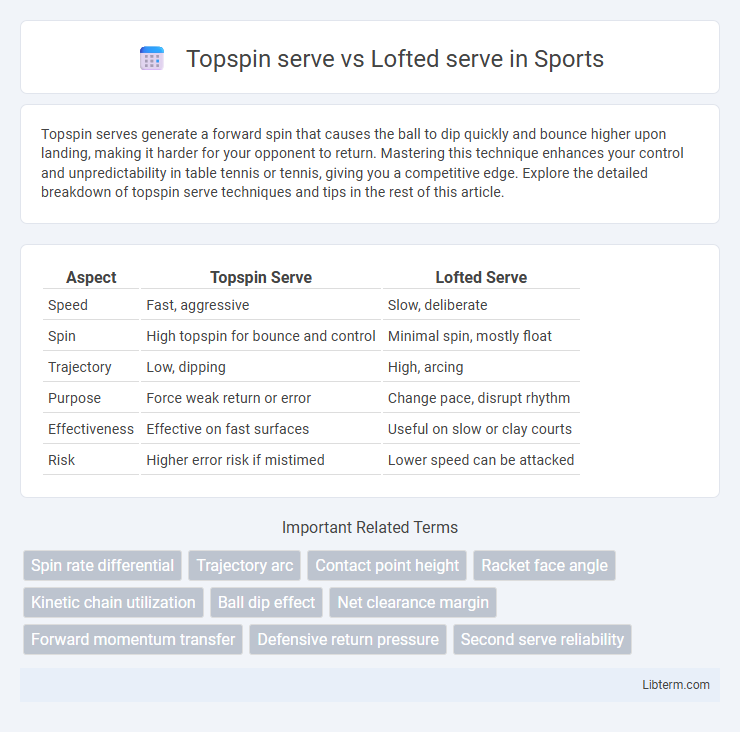Topspin serves generate a forward spin that causes the ball to dip quickly and bounce higher upon landing, making it harder for your opponent to return. Mastering this technique enhances your control and unpredictability in table tennis or tennis, giving you a competitive edge. Explore the detailed breakdown of topspin serve techniques and tips in the rest of this article.
Table of Comparison
| Aspect | Topspin Serve | Lofted Serve |
|---|---|---|
| Speed | Fast, aggressive | Slow, deliberate |
| Spin | High topspin for bounce and control | Minimal spin, mostly float |
| Trajectory | Low, dipping | High, arcing |
| Purpose | Force weak return or error | Change pace, disrupt rhythm |
| Effectiveness | Effective on fast surfaces | Useful on slow or clay courts |
| Risk | Higher error risk if mistimed | Lower speed can be attacked |
Introduction to Tennis Serves
Topspin serves generate a forward spin that causes the ball to dip quickly and bounce higher, increasing control and making it difficult for opponents to attack. Lofted serves, in contrast, use a high arcing trajectory to push opponents back, trading speed for placement and strategic court positioning. Understanding the mechanics and tactical applications of these serves is essential for mastering diverse serve techniques in tennis.
What is a Topspin Serve?
A Topspin serve in tennis is a powerful shot where the ball rotates forward rapidly, causing it to dip sharply and bounce high after landing. This spin increases control and makes it difficult for opponents to return effectively, especially when aimed near the baseline. In contrast to a Lofted serve, which uses a higher trajectory for depth and pace, the Topspin serve emphasizes precision and aggressive ball movement.
What is a Lofted Serve?
A lofted serve in tennis is a high-trajectory serve designed to send the ball deep and slow over the net, challenging the opponent with its bounce and placement rather than speed. Unlike a topspin serve, which uses forward spin to create a faster, dipping ball, a lofted serve emphasizes height and control to exploit the opponent's positioning and timing. This technique is effective for disrupting rhythm and forcing errors by mixing up the pace and angle of serves during a match.
Mechanics of the Topspin Serve
The mechanics of the topspin serve emphasize a forward brushing motion of the racket strings against the ball, generating rapid forward rotation that causes the ball to drop quickly after crossing the net. This serve requires precise wrist snap and coordinated arm acceleration to impart maximum spin and control, increasing the ball's margin of safety and bounce upon landing. Compared to the lofted serve, which relies on high trajectory and slower speed, the topspin serve's mechanics enable aggressive placement and consistency due to enhanced ball rotation and speed.
Mechanics of the Lofted Serve
The mechanics of the lofted serve involve a high ball toss combined with an open racket face to create an upward trajectory, generating less spin and more height compared to the Topspin serve. This technique prioritizes distance and court depth, forcing opponents back by delivering a slower, arcing ball that is harder to attack. Players rely on precise timing and controlled wrist action to maintain consistency while maximizing the lofted ball's deceptive trajectory.
Spin and Trajectory Differences
The Topspin serve generates a forward spin that causes the ball to dip rapidly and bounce high, creating a sharp trajectory ideal for aggressive shots. In contrast, the Lofted serve features minimal spin and a high, arcing trajectory, making it slower and easier to return but useful for placing the ball deep. The difference in spin between heavy topspin and nearly flat lofted serves fundamentally alters the ball's flight path and bounce behavior.
Effectiveness in Match Play
Topspin serves generate a high degree of ball rotation, causing unpredictable bounces that challenge opponents' returns and increase serve effectiveness in competitive match play. Lofted serves, characterized by a slower speed and higher trajectory, offer an element of surprise but are more susceptible to aggressive returns due to extended ball hang time. Statistical analysis reveals that players utilizing topspin serves typically secure a higher first-serve win percentage, enhancing their ability to control rallies and dictate match tempo.
Advantages of Topspin Serve
Topspin serve generates a high-forward spin that makes the ball dip quickly, increasing control and reducing the risk of faults. This spin enhances ball speed and bounce unpredictability, challenging the opponent's return accuracy. Players benefit from improved consistency and offensive opportunities due to the aggressive nature of the topspin trajectory.
Advantages of Lofted Serve
The lofted serve in tennis offers strategic advantages by creating a high-arching trajectory that forces opponents farther behind the baseline, disrupting their timing and positioning. This type of serve increases reaction time for the server's next move while making return shots more challenging due to the variable spin and angle. The lofted serve also aids in conserving energy during long matches by reducing the need for aggressive, high-speed serves.
Choosing the Right Serve for Your Game
Choosing the right serve between a Topspin serve and a Lofted serve depends on your playing style and strategy. A Topspin serve generates high spin, making the ball dip quickly and bounce sharply, ideal for aggressive players aiming to unsettle opponents. The Lofted serve offers a higher trajectory with slower speed, giving opponents less reaction time and is effective for defensive players seeking to control the pace of the rally.
Topspin serve Infographic

 libterm.com
libterm.com